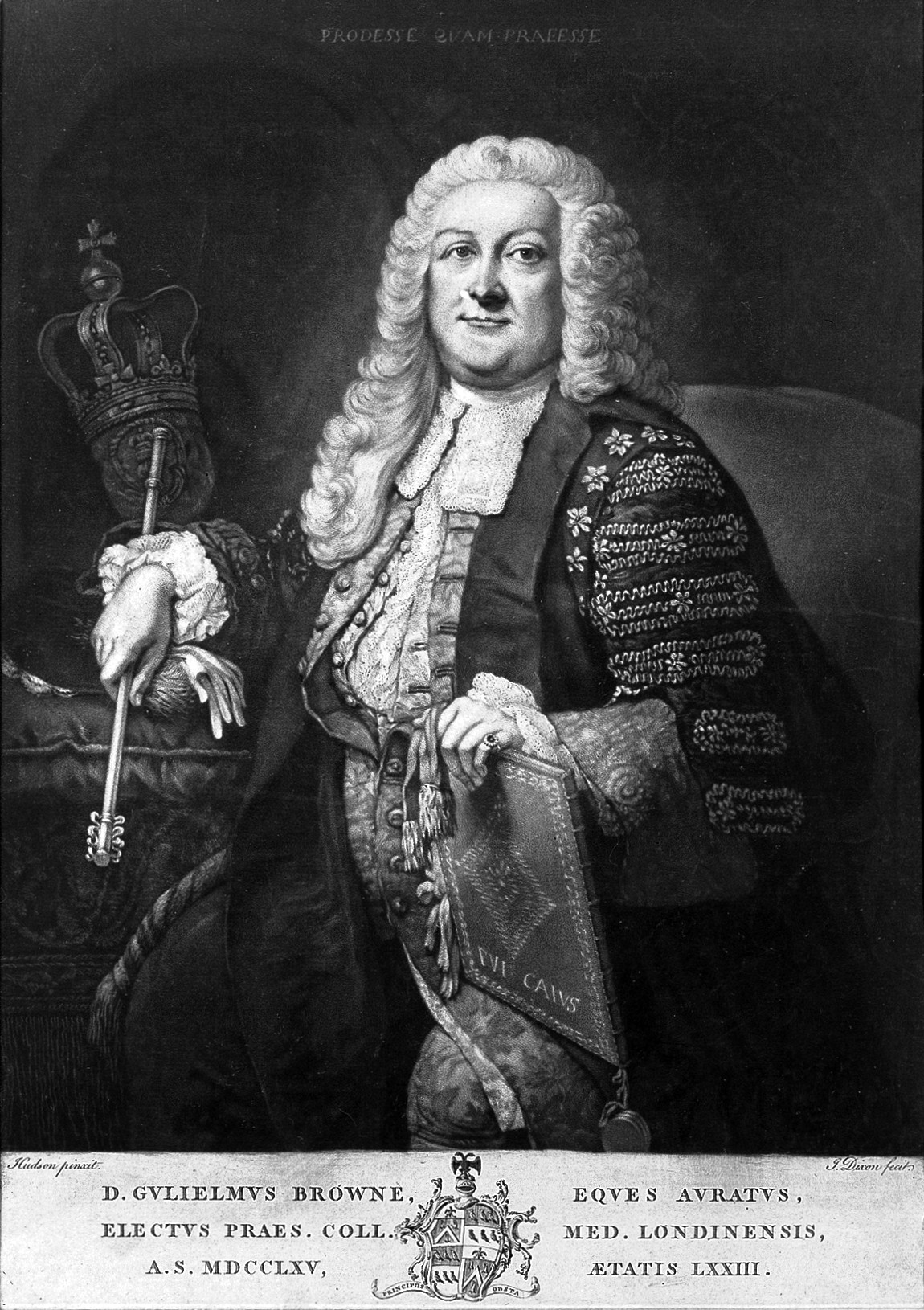William Browne (physician) on:
[Wikipedia]
[Google]
[Amazon]
 Sir William Browne FRS (1692 – 10 March 1774) was an English doctor.
Sir William Browne FRS (1692 – 10 March 1774) was an English doctor.
The king to Oxford sent a troop of horse,
For tories own no argument but force;
With equal care to Cambridge books he sent,
For whigs allow no force but argument.
 Sir William Browne FRS (1692 – 10 March 1774) was an English doctor.
Sir William Browne FRS (1692 – 10 March 1774) was an English doctor.
Life
Browne was born in County Durham, and was educated atDurham School
Durham School is an independent boarding and day school in the English public school tradition located in Durham, North East England and was an all-boys institution until 1985, when girls were admitted to the sixth form. The school takes pupils ...
and at Peterhouse, Cambridge. After graduating (1711 BA, 1714 MA, & 1716 license), he worked as a doctor in King's Lynn, Norfolk
Norfolk () is a ceremonial and non-metropolitan county in East Anglia in England. It borders Lincolnshire to the north-west, Cambridgeshire to the west and south-west, and Suffolk to the south. Its northern and eastern boundaries are the No ...
, for more than thirty years before moving to Bloomsbury, London, in 1749. He was President of the College of Physicians A college of physicians is a national or provincial organisation concerned with the practice of medicine.
{{Expand list, date=February 2011
Such institutions include:
* American College of Physicians
* Ceylon College of Physicians
* College of Phy ...
in 1765 and 1766, having been a Fellow of the college since 1726; he resigned during his five-year term of office because of a dispute. He became a Fellow of the Royal Society
The Royal Society, formally The Royal Society of London for Improving Natural Knowledge, is a learned society and the United Kingdom's national academy of sciences. The society fulfils a number of roles: promoting science and its benefits, re ...
in 1739, and was knighted in 1748. He died on 10 March 1774, and left money for a scholarship at Peterhouse and gold medals to be awarded for poetry in Greek and Latin to Cambridge students (the Sir Willam Browne's Medals).
While Browne wrote various books, his most enduring work is an epigram on why George I George I or 1 may refer to:
People
* Patriarch George I of Alexandria (fl. 621–631)
* George I of Constantinople (d. 686)
* George I of Antioch (d. 790)
* George I of Abkhazia (ruled 872/3–878/9)
* George I of Georgia (d. 1027)
* Yuri Dolgor ...
donated the library of the Bishop of Ely to Cambridge University
The University of Cambridge is a Public university, public collegiate university, collegiate research university in Cambridge, England. Founded in 1209 and granted a royal charter by Henry III of England, Henry III in 1231, Cambridge is the world' ...
and not to Oxford University
Oxford () is a city in England. It is the county town and only city of Oxfordshire. In 2020, its population was estimated at 151,584. It is north-west of London, south-east of Birmingham and north-east of Bristol. The city is home to th ...
:
Family
Whilst in Kings Lynn William married Mary Greene (1699–1763), daughter of Elizabeth née Truman of Maryland and Charles Greene, an apothecary. They had one daughter Mary (1730–1773) who was the second wife of William Folkes (1700–1773), a barrister. Their son was Sir Martin Browne Ffolkes FRS MP 1st Baronet Ffolkes of Hillington.List of publications
* ''Dr Gregory's Elements of Catoptrics and Dioptrics, translated from the Latin original by William Browne, MD, at Lynn Regis, in Norfolk. (with some additions)'' (London, 1735) * ''Oratio Harveiana, Principibus Medicis parentans; Medicinam, Academias utrasque laudans; Empiricos eorum cultures perstringens; Collegium usque a natalibus illustrans: in Theatro Collegii Reg. Med. Lond. habita Festo Divi Lucae'' (London, 1751) * ''A Letter from Sir William Browne, deputy-lieutenant of the County of Norfolk, to his Tenants and Neighbours, Seriously Recommended at this Time to the Perusal of all the People of England'' (London, 1757) * ''Two Odes in Imitation of Horace (the second Ode addressed to the Right Hon. Sir Robert Walpole, on ceasing to be Minister, 6 February 1741'' (London, 1763 & 1765) * ''Opuscula varia utriusque Linguae (containing the Harveian Oration, 1751)'' (London, 1765) * ''Appendix Altera ad Opuscula'' (his farewell oration) (London, 1768) * ''Fragmentum Isaaci Hawkins Browne Arm. sive Anti-Bolinbrokius. Liber Primus, translated for a second Religio Medici'' (London, 1768) & Fragmentum Isaaci Hawkins Browne completum (London, 1769) * ''Appendix ad Opuscula'' (a Latin Ode with translations) (London, 1770) * ''A Proposal on Our Coin: to Remedy all Present and Prevent all Future Disorders'' (London, 1771) * ''A New Year's Gift: a Problem and Demonstration on the XXXIX Articles'' (London, 1772) * ''The Pill Plot. To Dr Ward, a Quack of Merry Memory, written at Lynn, 30 November 1734'' (London, 1772) * ''Corrections in Verse from the Father of the College on Son Cadogan's Gout Dissertation, containing False Physic, False Logic, False Philosophy'' (1772) * ''Speech on the Royal Society, Recommending Mathematics as the Paramount Qualification for their Chair'' (1772) * ''Elogy and Address'' (London, 1773) * Latin version of the Book of Job (unfinished)References
{{DEFAULTSORT:Browne, William 1692 births 1774 deaths 18th-century English medical doctors Alumni of Peterhouse, Cambridge Fellows of the Royal Society Presidents of the Royal College of Physicians People from County Durham